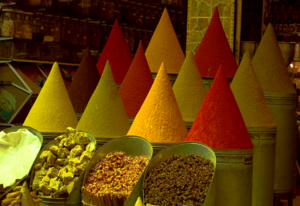
Many spices are an important part of tasty and traditional cuisine. Stocking the basic range of spices will make your cooking easier and more interesting. This article discusses some of the necessary basics when stocking spices for the pantry.
Choosing spices[edit | edit source]
- Where possible, buy whole spices and grind them as needed.
- For ground spices, purchase them from a reputable store where you know the turnover is brisk and regular. Ask around for suggestions as to good places to get fresh spices from.
Grinding your own spices[edit | edit source]
Use a spice grinder or follow the suggested process here:
Purchase fresh whole spices. Dry fry the whole spices over low, gentle heat. Only cook gently for a short time, as too much cooking can make the spices bitter. Allow to cool completely, then grind in a mortar with a pestle or use a spice or coffee grinder.
Large amounts of less fine spices can be ground in a food processor if it has the right attachments.
Suggested spices[edit | edit source]
Here is a list of suggested spices for adding to your pantry (and the best forms to have them in):
- Bay leaves - whole dried and ground
- Cardamom - seeds, pods and ground
- Cayenne pepper - ground
- Chilli - dried whole and in powdered form
- Cinnamon - sticks, ground
- Cloves - whole and ground
- Coriander - whole seeds, powdered
- Cumin - whole seeds, ground
- Curry powder - many varieties, select your favourites (but keep trying new ones)
- Fennel seeds - whole seeds
- Fenugreek - whole and ground
- Mace - whole, ground
- Mustard seeds - all varieties
- Nutmeg - whole (to be ground, use a nutmeg grinder), ground
- Paprika - natural mild or hot and smoked (Spanish), powdered form
- Peppercorns - whole and ground, black, white, red, green
- Poppy seeds - whole, white and black
- Sesame seeds - whole, white and black
- Star anise - whole and ground
- Turmeric - ground, fresh
And...
- Favourite mixed seasonings - these vary according to region and cuisine style; keep trying new ones to find the ones that work best for your cooking needs and taste buds.
Keeping spices[edit | edit source]
Store spices in small quantities in a dark, dry place. Light and heat are enemies of spice quality. They should be kept in airtight containers or sealed packages.
Sesame and poppy seeds should be stored in a freezer, to prevent them from turning rancid due to oil levels.
Most spices should be used within three to six months of being ground. If they smell stale or like wood shavings, then they're ready for the bin. If purchased from a commercial supplier, there should be due date labels for following. Renew the spices quickly and use up quickly, with joy. Fresh spices are always awaiting you!